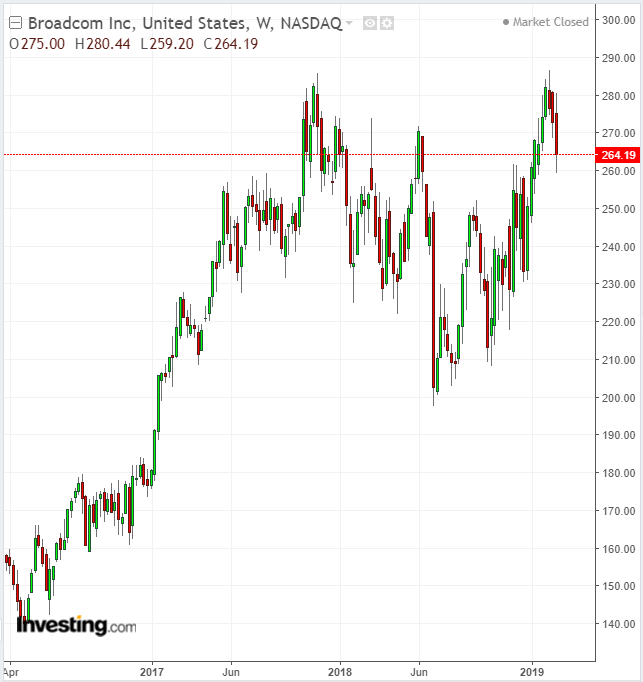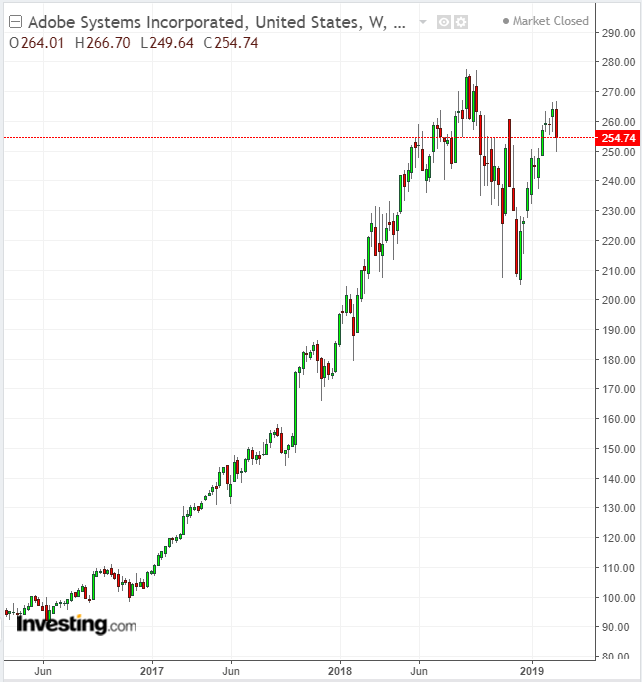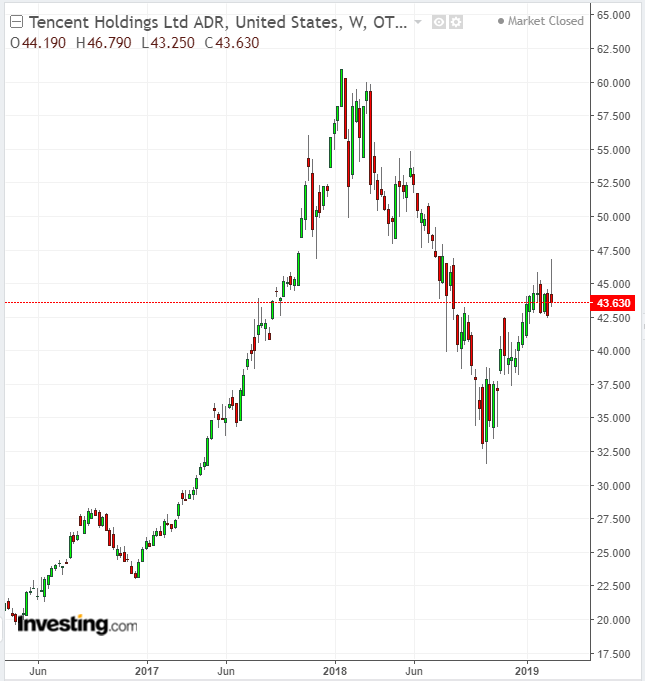The U.S. stock market’s bull-run hit a rough patch last week when global economic headwinds once again weighed on investors. Worries about the future of U.S.-China trade, a slowdown in Europe, and Brexit kept shares under pressure most of the week, with the benchmark S&P 500 capping its worst week of the year.
That short-term weakness, however, shouldn’t hide the fact that equities continue to show remarkable resilience after going through a major correction late last year. As well, the S&P 500 has climbed more than 300% since hitting its financial crisis low on March 9, 2009, led by consumer discretionary and the world’s largest technology companies.
With the macro environment likely to remain uncertain in the short-run, here are three stocks that could move in the coming week due to earnings reports and developments in their respective sectors.
1. Broadcom
The last chipmaker to report during this earnings season, Broadcom (NASDAQ:AVGO) is worth watching. The company reports Q1 2019 numbers on Thursday, March 14, after the close. Consensus calls for $5.24 EPS on $5.74B in revenue.

Despite the latest downturn in the semiconductor industry, which has hit other producers hard, Broadcom seems to be weathering the storm quite well. Its shares, which closed on Friday at $264.19, are up about 10% over the past six months when the Semiconductor Index fell more than 4%.
One reason behind this better performance is the company’s upbeat forecast for its sales and profit for the fiscal 2019. Broadcom is expected to report adjusted earnings per share of $23.04 for fiscal 2019—up from estimates of about $21.50 in October.
Broadcom’s rising estimates stand in contrast to other companies that derive a big portion of their sales by supplying parts to Apple (NASDAQ:AAPL), which has shown considerable weakness in its flagship, iPhone market. According to a Bank of America Merrill Lynch research, cited by Bloomberg in January, Broadcom’s dependence on Apple has shrunk to about 15-20%, down from 25%.
That is due in part to the company’s acquisition of the New York-based software producer CA Technologies last year. Analysts led by Vivek Arya wrote that more than 80% of Broadcom’s sales are now derived from “more stable, sustainable enterprise, cloud, networking, software [and] storage segments.”
2. Adobe
Another technology name that could surprise investors this coming week is Adobe Systems (NASDAQ:ADBE). The maker of Photoshop releases its fiscal 2019, first quarter earnings on Thursday, March 14, after the close.

During a conference call in December, the company’s CEO, Shantanu Narayen, raised investor hopes by offering an upbeat forecast for the current fiscal year, saying strong demand from U.S. companies and emerging markets will propel sales higher by 20%. For Q1, analysts expect Adobe to report a 23% surge in sales to $2.55 billion and profit to expand to $1.62 a share from $1.55 from a year ago.
Adobe, which competes with Salesforce.com (NYSE:CRM) in the marketing and e-commerce technology segment, is trying to boost growth by expanding its business offerings while strengthening its core creative software business. The company built its name around desktop publishing with products like Acrobat and developed and popularized the PDF file format, but has transitioned to a cloud-based, subscription business.
The company expects a 25% increase in bookings in its digital-experience business, the corporate segment that includes the marketing technology and data and analytics products. Trading at $245.74 on the final day of last week's trade, Adobe shares are up 18% over the past one year.
3. Tencent
China’s largest technology stocks, including Tencent Holdings (OTC:TCEHY), may face more selling pressure in the coming week on concerns that the recent rally in the Asian nation’s shares has gone too far. Strong evidence in this regard emerged on Friday when a single sell rating on Chinese insurer People's Insurance Group by a leading brokerage house in the country, triggered a massive sell-off, costing investors $345 billion in losses.

Shares of Tencent, considered China’s Facebook (NASDAQ:FB), have fully participated in the recent upsurge, recovering almost 50% from its October low, helped by new licenses to operate games in China. Next week, however, might test investor faith in the company’s future if selling pressure continues for Chinese stocks. Tencent fell 1.85% on Friday to close at $43.63.
With video blogging, instant messaging, plus a payment app all rolled into one platform, Tencent offers a dynamic ecosystem to over a billion Chinese subscribers. In addition to Tencent's WeChat messaging, the company is also investing in other growth areas such as cloud computing and digital payments. The company reports Q4 2018 earnings on Wednesday, March 20, before the market opens.
